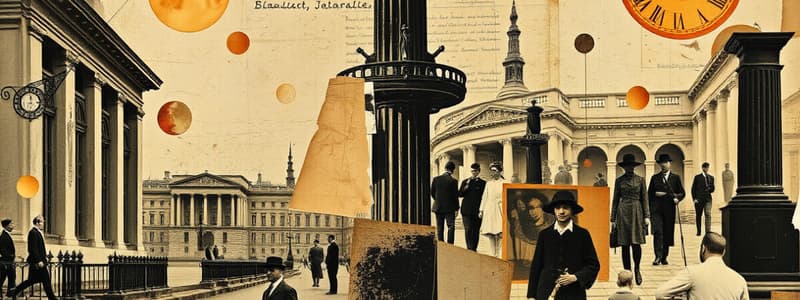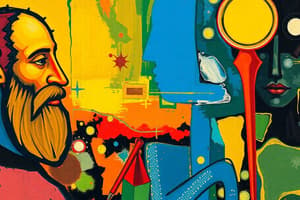Podcast
Questions and Answers
The High Enlightenment occurred between the years 1730 and 1780.
The High Enlightenment occurred between the years 1730 and 1780.
True (A)
Locke and Bayle were opposed to the idea of separating Church and State.
Locke and Bayle were opposed to the idea of separating Church and State.
False (B)
Coffeehouses and newspapers played no role in the circulation of ideas during the Enlightenment.
Coffeehouses and newspapers played no role in the circulation of ideas during the Enlightenment.
False (B)
The French Revolution of 1789 was a direct result of Enlightenment thinkers' influences.
The French Revolution of 1789 was a direct result of Enlightenment thinkers' influences.
Rousseau believed that society was inherently good and corrupts mankind.
Rousseau believed that society was inherently good and corrupts mankind.
Freedom of thought and expression is considered a key Enlightenment value.
Freedom of thought and expression is considered a key Enlightenment value.
The Late Enlightenment focused mainly on reinforcing traditional authorities.
The Late Enlightenment focused mainly on reinforcing traditional authorities.
Kant was one of the influential thinkers discussed during the Enlightenment period.
Kant was one of the influential thinkers discussed during the Enlightenment period.
Rousseau believed that true democracy applied equally to women.
Rousseau believed that true democracy applied equally to women.
Kant argued that the Enlightenment was about the liberation of human beings.
Kant argued that the Enlightenment was about the liberation of human beings.
Mary Wollstonecraft supported Rousseau's theories regarding women's education.
Mary Wollstonecraft supported Rousseau's theories regarding women's education.
Montesquieu suggested that socio-economic concerns should be considered in politics.
Montesquieu suggested that socio-economic concerns should be considered in politics.
Beccaria supported the use of torture on those accused of a crime who have not been proven guilty.
Beccaria supported the use of torture on those accused of a crime who have not been proven guilty.
Rousseau advocated for a social contract that balances government and its citizens.
Rousseau advocated for a social contract that balances government and its citizens.
Kant emphasized personal responsibility as a key aspect of Enlightenment.
Kant emphasized personal responsibility as a key aspect of Enlightenment.
Thomas Hobbes was primarily concerned with women's rights in his writings.
Thomas Hobbes was primarily concerned with women's rights in his writings.
The letters 'st,' 'nd,' and 'rd' in ordinal numbers come from the last two letters of the words.
The letters 'st,' 'nd,' and 'rd' in ordinal numbers come from the last two letters of the words.
Pineberries are blue strawberries that taste like blueberries.
Pineberries are blue strawberries that taste like blueberries.
The Enlightenment period primarily occurred during the 19th and 20th centuries.
The Enlightenment period primarily occurred during the 19th and 20th centuries.
John Locke believed that human nature was fixed and unchanging.
John Locke believed that human nature was fixed and unchanging.
The Scientific Revolution was essential for the occurrence of the Enlightenment.
The Scientific Revolution was essential for the occurrence of the Enlightenment.
The Enlightenment produced various forms of literature, including books and essays.
The Enlightenment produced various forms of literature, including books and essays.
Isaac Newton's work influenced Enlightenment thought through his literary contributions.
Isaac Newton's work influenced Enlightenment thought through his literary contributions.
Salons were gatherings that played a role in spreading Enlightenment ideas.
Salons were gatherings that played a role in spreading Enlightenment ideas.
Flashcards are hidden until you start studying
Study Notes
Enlightenment Overview
- The Enlightenment, spanning the 17th and 18th centuries, was a European intellectual movement that integrated ideas about God, reason, nature, and humanity.
- Central themes included the celebration of reason, the understanding of the universe, and self-improvement.
Early Enlightenment (1685-1730)
- John Locke proposed that human nature is "mutable" and that knowledge arises from experience rather than innate truths.
- Isaac Newton's work in calculus and optics served as metaphors for Enlightenment ideas of measured change and enlightenment.
High Enlightenment (1730-1780)
- A period marked by religious innovation and materialism, questioning divine intervention in the universe's functioning.
- Locke and Pierre Bayle advocated for the separation of Church and State.
- New venues for idea exchange flourished, such as coffeehouses, newspapers, and salons.
Late Enlightenment (1780-1815)
- The French Revolution of 1789 aimed to challenge old authorities and create a rational society but resulted in chaos, illustrating the limitations of Enlightenment ideals.
Key Enlightenment Thinkers
- Thomas Hobbes: Examined societal elements, arguing for a strong central authority.
- John Locke: Emphasized natural rights and government’s role to protect them.
- Montesquieu: Advocated for the separation of powers to prevent despotism.
- Voltaire: Championed freedom of speech and religious tolerance.
- Jean Jacques Rousseau: Believed man is inherently good but corrupted by society; proposed social contract principles.
- Immanuel Kant: Promoted individual thought and responsibility; defined Enlightenment as emergence from self-imposed immaturity.
- Mary Wollstonecraft: Critiqued gender inequality; argued for women's education and rights in "Vindication of the Rights of Women."
- Cesare Beccaria: Opposed torture and capital punishment; emphasized justice and rights of the accused.
Concepts and Ideas
- The Enlightenment produced various works that laid foundational ideas influencing modern society.
- The movement emphasized individual rights, freedom of thought, and the need for societal reform.
- Philosophers' ideas challenged established norms, paving the way for contemporary discussions on rights and governance.
Current Relevance
- Students are encouraged to relate Enlightenment thinkers' ideas to modern society and current issues, fostering discussion on how these historical perspectives influence contemporary life and thought.
Studying That Suits You
Use AI to generate personalized quizzes and flashcards to suit your learning preferences.




